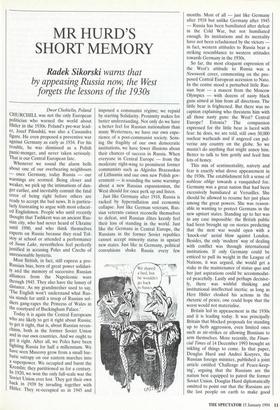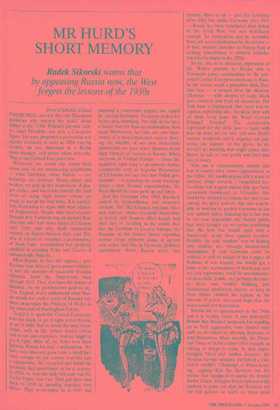MR HURD'S SHORT MEMORY
Radek Sikorski warns that
by appeasing Russia now, the West forgets the lessons of the 1930s
Dwor Chobielin, Poland CHURCHILL was not the only European politician who warned the world about Hitler in the 1930s. Poland's pre-war lead- er, Jozef Pilsudski, was also a Cassandra figure. He even proposed a preventive war against Germany as early as 1934. For his trouble, he was dismissed as a Polish panic-monger, and never taken seriously. That is our Central European fate.
Whenever we sound the alarm bells about one of our overbearing neighbours — once Germany, today Russia — our warnings are scorned. Being closer and weaker, we pick up the intimations of dan- ger earlier, and inevitably commit the fatal error of being right before others are ready to accept the bad news. It is particu- larly frustrating to argue with most educat- ed Englishmen. People who until recently thought that Tashkent was an ancient Rus- sian city, who had never heard of Ukraine until 1990, and who think themselves experts on Russia because they read Tol- stoy at school or attended a performance of Swan Lake, nevertheless feel perfectly justified in accusing Poles and Czechs of unreasonable hysteria.
Most British, in fact, still express a pro- Russian bias, born of great power solidari- ty and the memory of successive Russian alliances from the Napoleonic wars through 1945. They also have the luxury of distance. As my grandmother used to say, The English won't understand what Rus- sia stands for until a troop of Russian sol- diers gang-rapes the Princess of Wales in the courtyard of Buckingham Palace.' Today it is again the Central Europeans who are likely to get it right about Russia; to get it right, that is, about Russian revan- chism, both in the former Soviet Union and in our own countries. And we ought to get it right. After all, we Poles have been fighting Russia for half a millennium. We have seen Muscovy grow from a small bar- baric satrapy on our eastern marches into a superpower. We occupied and burnt the Kremlin; they partitioned us for a century. In 1920, we won the only full-scale war the Soviet Union ever lost. They got their own back in 1939 by invading together with Hitler. They re-occupied us in 1945 and imposed a communist regime; we repaid by starting Solidarity. Proximity makes for better understanding. Not only do we have a better feel for Russian nationalism than many Westerners, we have our own expe- rience of a post-communist society. Sens- ing the fragility of our own democratic institutions, we have fewer illusions about their chances of success in Russia. When everyone in Central Europe — from the moderate right-wing to prominent former communists such as Algirdas Brazauskas of Lithuania and our own new Polish gov- ernment — is sounding the same warnings about a new Russian expansionism, the West should for once perk up and listen.
Just like Germany after 1918, Russia is racked by hyperinflation and economic collapse. Just like German veterans, Rus- sian veterans cannot reconcile themselves to defeat, and Russian elites keenly feel their loss of standing in the world. Just like the Germans in Central Europe, the Russians in the former Soviet republics cannot accept minority status in upstart new states. Just like in Germany, political convulsions shake Russia every few
months. Most of all — just like Germany after 1918 but unlike Germany after 1945 — Russia has been humiliated after defeat in the Cold War, but not humiliated enough. Its institutions and its mentality have not been refashioned by the victors in fact, western attitudes to Russia bear a striking resemblance to western attitudes towards Germany in the 1930s.
So far, the most eloquent expression of the West's attitude to Russia was a Newsweek cover, commenting on the pro- posed Central European accession to Nato. In the centre stood a perturbed little Rus- sian bear — a mascot from the Moscow Olympics — with dozens of nasty black guns aimed at him from all directions. The little bear is frightened. But there was no caption explaining who threatens him with all those nasty guns: the West? Central Europe? Estonia? The compassion expressed for the little bear is laced with fear: he does, we are told, still own 30,000 nuclear warheads and if angered can pul- verise any country on the globe. So we mustn't do anything that might annoy him. Better to talk to him gently and feed him lots of honey.
This mix of sentimentality, naivety and fear is exactly what drove appeasement in the 1930s. The establishment felt a sense of noblesse oblige towards a vanquished foe. Germany was a great nation that had been excessively humiliated at Versailles. She should be allowed to resume her just place among the great powers. She was reason- able in wanting to protect Germans in the new upstart states. Standing up to her was in any case impossible: the British public had been brought up on stories predicting that the next war would open with a 'knock-out' aerial blow against London. Besides, the only 'modern' way of dealing with conflict was through international
institutions. If only Germany could be enticed to pull its weight in the League of Nations, it was argued, she would get a stake in the maintenance of status quo and her just aspirations could be accommodat- ed peacefully. Lastly and perhaps decisive- ly, there was wishful thinking and institutional intellectual inertia: as long as Herr Hitler cloaked his actions in the rhetoric of peace, one could hope that the worst would not materialise.
Britain led in appeasement in the 1930s and it is leading today. It was principally Britain that blocked proposals for standing up to Serb aggression, even limited ones such as air-strikes or allowing Bosnians to
arm themselves. More recently, the Finan- cial Times of 14 December 1993 brought an inkling of things to come. In that paper,
Douglas Hurd and Andrei Kozyrev, the Russian foreign minister, published a joint article entitled 'Challenge of Peace-keep- ing', arguing that the Russians are the nation best equipped to patrol the former Soviet Union. Douglas Hurd diplomatically omitted to point out that the Russians are the last people on earth to make good















 Previous page
Previous page